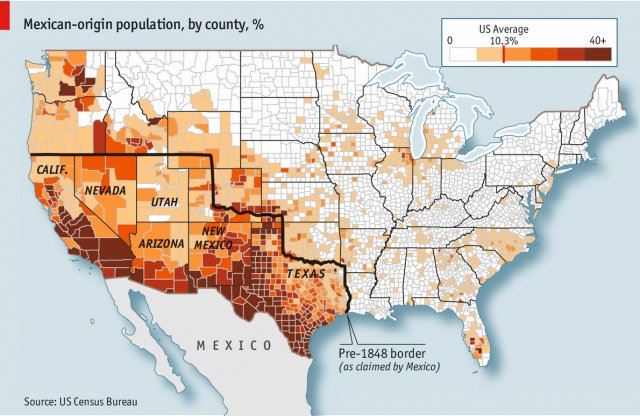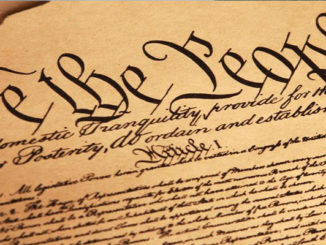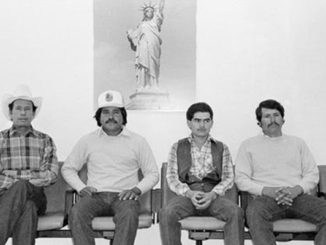
by Alex Gonzalez
After the rally in New Mexico, many reporters and pundits wrote pieces about it trying to figure out a “Trump strategy” noting that New Mexico is one half Hispanic and voted overwhelmingly Democrat in 2018 and the state has not gone Republican since 1992 in a presidential election, except in 2004. They also too tried to show that though there is a small groups of “Hispanic” supporters for Trump in New Mexico, some Hispanics in the state do support Trump fervently. And this is a fact. In New Mexico and Texas, traditionally 30% of “Hispanics” support or vote Republican in presidential election or statewide races.
Apart from statistics used by reporters to show the majority of Hispanics, about 70%, in New Mexico rebuked Trumpism and his policies in 2016-18, few reporters tried to form a profile of “Hispanics supporting Trump.” Few pundits touched on the cultural and racial arguments of those Hispanics supporting Trump make: 1. deny Trump was a racist and 2. That Trump immigration policies were not anti-Hispanic, even if the record shows the opposite.
Some of these Hispanic Trump supporters deny Trump immigration policies are anti-Hispanic and argued that “they belonged to families that had been in the United States for at least three generations,” and that their support for the president was most closely tied to his immigration policies.
We are American,” said Martha Garcia, 65, who moved to New Mexico from Southern California two decades ago. She said she voted for Mr. Trump in 2016 and agreed with much of his rhetoric about the need to curb immigration.
These views on Immigration and denial of ethnicity are the cultural views that actually fit the profile of that what kind of Hispanics will vote for Trump, and should not be overlooked because it does reveal how the GOP usually coerce and bullies older Mexican-Americans into thinking that they only way to be “Americans” is to deny who they are, and embrace an alleged “American identity” invented by older white party bosses to force Mexican-Americans into thinking whites still get to decide who is ‘American.” For example, some Hispanics supporting Trump argued that:
Trump’s rhetoric protected Hispanics like them because it emphasized their American nationality over their ancestry.
While the campaign has officially labeled its outreach effort “Latinos for Trump,” all of those interviewed eschewed the label and instead identified as Hispanic, which emphasizes ties to Spain and the Spanish language instead of Latin America, and is a term that is often more readily embraced among conservatives… When asked about the mass shooting last month in El Paso, when a white nationalist killed 22 people in the most deadly attack targeting Latinos in modern American history, most simply shrugged. Several said they had never heard of the shooter’s manifesto, which said the attack was “a response to the Hispanic invasion of Texas.”
Essentially, you have a group of older third generation of Mexican-Americans claiming that they are “Hispanics” and denying that the mass killing in El Paso was deliberately against Mexicans and Hispanics to stop an “invasion,” even these “invaders” were American citizens who happened to look “Mexican” or “Hispanic” from South Texas.
How can you rationalize this? Mexican-Americans denying Trump Immigration policies are anti-Hispanic and anti-Mexico and quickly veer to reject that mass the shooting was a deadly racist attack aimed at killing Mexicans and Hispanic American citizens?
How can Republicans party bosses and activists coerce Hispanics into claiming that the racist leader of the party, Trump, is not a racist, that the mass killing in El Paso was not against U.S.-born Mexican-Americans, or Hispanics, and that their only way for them to be accepted as full “Americans” is to deny they are Mexican-Americans? As some of reports noticed in who those supporters were mostly older Hispanics, post-2016 election Analysis about “Hispanics” who voted for Trump are the same that would fall for this GOP party cultural “Hispanic” trap: older and poor Hispanics. The post-2016 analysis shows Trump did much better than Mitt Romney among Hispanics in the rural Southwest – rural counties with large Hispanic populations in New Mexico, Texas, Arizona and Colorado and Nevada.
Why would Hispanics vote for Trump, despite his many anti-immigrant and anti-Mexican statements? One answer: poverty. The Hispanic communities in the rural Southwest that moved toward Trump were some of the poorest in their states. One of Trump phony immigration argument for Hispanics is that immigrants will take their jobs and that immigrants get on welfare.
Similarly, older Hispanics also tend to believe in the idea of “patriotism;” so Republican party bosses and activists made them believe that the only way they can be fully Americans and “patriots” is by denying their identity as Mexican-Americans; keep in mind that these are rules of “patriotism” set by white party bosses to discriminate against Mexicans, under an alleged patriotism, and still force Mexican-Americans to say this is not a racist and discriminatory party agenda.
Moreover, keep in mind that these Mexican-Americans who grew before 1960s in places like Texas and Arizona where Mex-Americans were subjected to cultural shame and even corporal punishment in school just for speaking Spanish, and as result, have hesitation about their Mexican-American identity; insecurity about their Mexican-American identity comes from the harsh treatment some Mexican-Americans in the Southwest experienced when they were growing up, so a more generic label like “Hispanic” is often used in Republicans circles as coping mechanism to be accepted in white Republicans circles that have anti-Mexican members controlling the party.
And the GOP party bosses exploit these cultural traumas in older Mexican-Americans with invented tests of patriotism.
This is a very complex issue but worth analyzing because it affects a generation of Mexican-American who were punished as children in school for speaking Spanish, which led to Mexican-Americans feeling inferior and ashamed.
Samuel Huntington argued that national identities are constructed by ideology; and Identity is an individual’s or group’s sense of the self. Benedict Anderson’s Imagine Communities also argues that Identities are imagining selves. They are what we think we are and what we want to be. People may inherit ethnic identity, and they can embrace it or reject it. Moreover, identities are defined by the self but they are also the product of interactions between the self and the others. How others perceive an individual or a group affect the self-definition of that individual or group.
National identity is an “invention” as Benedict Anderson argues in Imagined Communities, or “constructed” as Huntington argues—and often they are mere bureaucratic procedures. So Individuals have a natural tendency to seek spiritual or ethnic connection with those with whom they share similar ancestral roots. Thus, nation-ness, like cultural identities, are cultural artifacts that used to be invented by kings, and now are invented by governments through an national myths, similar “group experience” or ideology, or by religious leaders as it the case of the Jews; so identity is the voluntary individual’s desire wanting to be part of something bigger.
Before the 1960s, there was a generational shaming for Mexican-Americans, this leads to some Mexican-Americans denying their Mexican-American identity (Mexican-ness) to avoid any suspicion of “double loyalties.” However, Mexican-Americans are the only ethnic group with a legitimate historical emotional attachment to the Southwest. But, like in rally in Rio Vista, New Mexico, and like in most Republican and “conservative circles in the Southwest, they were force to reject their identity so as to prove their patriotism.
However, because one’s identity also depends on how others perceive you, even if Mexican-Americans don’t want to be perceived as Mexicans, they are already perceived as Mexicans by the others because that is what prompted other to ask them not to be too “Mexican.” Moreover, denying that you are Mexican-American could also be perceived as a sign of weakness and shame more than “patriotism.” So the idea behind Republicans coercing Mexican-Americans to use alternative labels like Hispanic is not to build a more cohesive “Hispanics base” but rather to fracture and dilute, or at least retard, any Mexican-American political influence.
Furthermore, in Republican circles, turning the Mexican-American identity into something negative it is also a tool to suppress the empowerment of Mexican-Americans in politics. Unlike Cubans, who are concentrated in south Florida and are only 4% of all “Hispanics” in the U.S., Mexican-Americans are concentrated across 8 states and in the Southwest and they are 70% of all Latinos, and as they are the only ethnic group with legitimate claims to this land since they have been longer than anyone else. Thus, to prevent, or retard, this cultural awareness and Mexican-American empowerment from coming together as a cohesive political force across neighboring states is one reason why Republicans shame Mexican-Americans and give them new labels like Hispanics. Many party activists resort to cultural shame and portray the Mexican-American identity as anti-American, anti-Western and anti-Christian culture, despite fact Mexican culture itself is an offspring of Western culture and Christianity.

But much of this cultural shaming, and demonization of the Mexican-American identity – especially in politics – has to do how Mexican-Americans, the older generations, approach their history and ethnic identity with a cultural insecurity and fear of being accused of “dual loyalism.”
As I have argued before, no other ethnic group has been here in the U.S. longer than Mexican-Americans. But their political power – millions of new voters- is only a recent things; so many of already-established and “assimilated” older -generations sometimes have hesitations to embrace the new wave of Mexican immigrants from the 1990s, which led to a large increase of Mexican-American community in the Southwest and across the nation to 40 million.
To some degree, it is the insecurity of the older generations that still allow this demonization of the Mexican-American identity by Republican politicians and party activists who to turn the Mexican-American identity into something negative and “anti-American.”
Some Republican groups with lots political clout understating this “Mexican” insecurity and use it against them to suppress the identity; sometimes they even hire non-Mexican “Latinos/Hispanics” to instill shame in Mexican-Americans and de-legitimize the Mexican-American presence in the Southwest, their culture and history. In this case Steve Cortes, a Colombian from Chicago, who was at the rally in New Mexico and has been a Trump supporter defending Trump immigration policies.
I have also argued that many Republican party bosses and interests groups have vested interests in bringing non-Mexicans Latinos from others states manipulate Mexican-Americans.
Too, often, Mexican-American are trapped into the “Latino” or “Hispanics” labels because the Hispanic label is used interchangeably by political small groups, like Cubans, to further their agenda by claiming to represent all Hispanics. However, this Hispanic identity is weak and easily fractured because it is a political creation and it does not really embody the group(s) experience that tend to strengthen a community. It is only when a community shares a common cultural experience that it can be built into political power.
And this is how the Trump campaign has hired “Hispanics like Steve Cortes and Cubans from Florida, to lead Hispanics in the Southwest by pushing anti-Mexico and anti-Hispanic party propaganda. In sending “Hispanics” to the Southwest, Trump hopes that Mexican-Americans will follow a party “Hispanic” agenda and avoid directly addresses the interests or concerns of 40 million of Mexican-Americans in the Southwest who feel attacked by his Immigration policies.
But these are irrational anti-Mexico policies that even white Republican politicians from border states disapprove and want a more harmonious free trade policies with Mexicom and even support a comprehensive Immigration reform.
But let’s be clear that these cultural exigencies of loyalism to Mexican-Americans are purely political and have nothing to do with American ideals, the U.S. Constitution and patriotism; these demands are purely party ideas push by rank-in-file party activists, and some state parties bosses, who do perceive that rise of a cohesive Mexican-American political force as a threat to their power structure in state like Texas and Arizona and “white-ness.”
Moreover, across generations, Mexican-Americans interact fully and the they are aware of common cultural lineage, and hold their Mexican heritage (or Mexican-ness) highly. It is only in politics, especially in conservative circles, that Mexican-Americans are demanded that they prove their loyalism, and abandon any display of their Mexican-ness.
I don’t expect non-Mexican Latinos to understand why Trump overt anti-Mexican policies and are so vile. For the same reason that they won’t understand why Mexican-Americans in 1930s who were Americans citizens were rounded up and deported under FDR to give jobs to poor whites who were suffering during the Great Depression. In don’t expect non-Mexican Latinos do understand why Eisenhower deported American citizens and Mexican immigrants as “wetbacks” to give jobs to returning GIs. I don’t expect non-Mexican Latinos to understand why GI Mexican Americans, after fighting in Europe, they came home and had to fight, here at home, for the right to be buried with same honors as any other “white” soldiers. This is an issue that pertains mostly to Mexican-Americans in the Southwest. This contentious American history is unique to Mexican-Americans. As a result, Trump policies are more offensive to Mexican-Americans than any other group, and thus, why Trump want to camouflaged as “Hispanic” support.
I don’t expect those so-called “Latinos” like Steve Cortes and few Cubans in Florida who are getting ready to support Trump so they can be paraded as “Latino supporting Trump” by the RNC and Trump campaign. And it is Ok since many have to keep their token political titles and get campaign jobs; but for Mexican-Americans, this is greater than this election and Trump.
For Mexicans-Americans, it all start with who we are, what we want as Americans. In the Southwest, Mexican-American cultural heritage is greater an expression of what Jefferson intended under States Rights; states have the right to have their own culture, and neither the federal government, nor a National Party, have the right to impose national culture — or suppress one to favor others – other than a “common civic culture.” Jefferson would have agreed that a few states in the same region have the right to bond together to protect their culture and history, as long as it doesn’t conflict with the Constitution. Therefore, Mexican-Americans have the right to insist that their culture be reflected within whatever political party they join, and we have to right to demand our history and heritage no longer be scapegoated or be labeled as anti-American or as un-loyal. Once, this happens, the Mexican flag will be perceived as a symbol of resilience and history, not anti-Americanism or foreign culture.
Sure, there will always be those who are oppose to the idea that Mexican-Americans becoming more politically assertive. But that is politics, and the day of the “bad Mexican” will vanish since now we have a “reverse migration” and both Mexican in Mexico and Mexican-Americans here in the U.S. will find ways to iron out their regional differences and build a more cohesive economically integrated region that serves the interest of both nations.
Clearly, Trump and the RNC want these older third and fourth generations of Mexican-Americans to reject any ethnic cultural connections with the new waves of “Hispanics” – Mexican and Central Americans – so Trump can freely attack immigrants and the older Mexican-Americans can argue “it is not against us.”
Alex Gonzalez is a political Analyst, Founder of Latino Public Policy Foundation (LPPF), and Political Director for Latinos Ready To Vote. Comments to [email protected] or @AlexGonzTXCA




I am Puerto Rican and REFUSE to use the term Latino, as it basically denies our common hispanic ancestry with other hispanic american countries, we are not portuguese, we are not french, we are not latino, we are hispanics. That said there are some retards on denial thinking republicans care about them, but democrats should be careful since most hispanics are conservatives but vote only democrat because of republican racism.
Latino just mean we belong to Latin America and nothing else. Also implies all the romance language that evolve from Vulgar Latin
I generally like the article. It’s a little long, but its good that this view is out there. Unlike the comment below, I vehemently disagreee with the notion that “we are Hispanics.” Peoples have different histories and identities. Mexicans have AmeriIndigenous roos and part of the denial that the article speaks to is also a denial of our (people of Mexican and Central American and Andean) AmerIndigenous roots.
Hispanics are all people united but the Spanish language.
Hispanics are all people united but the Spanish language. Latin America and Spain, excluding Brazil,
People forget about their roots or heritage to escape their insecurities about themselves. People can draw border lines anywhere they want, they burn all historical fact, they can even beat the brown out of you. But, in the end we will never forget about the evil these people have caused and portrayed. We are and will always be a hard working, smart, inventive, proud, forgiving and compassionate people. And that will never be forgotten or lost.
This is a fantastic article and captures very accurately the many reasons some Mexicans voted for Trump and still will. Mexicans born prior to the 50’s had “ assimilate” banged into them by parents, teachers, and society, They wanted blend be accepted into an Anglo culture and not looked down upon for down being brown, or Mexican, or if you spoke a different language. It was a very different time.The rewards for rejecting where you came from was rewarded, friends, jobs, social support by Anglos. It is something that may seem ridiculous now in our generation but true. I went to school with kids that were Mexican but commonly said they were “ Spanish “ and somehow that was better and accepted as a step above being Mexican. My father was a very smart man. He told us, all six of his children the following. “ Here in the USA , Mexicans are stereo typed as , stupid , lazy, and dirty . In your everyday life it will be your responsibility to contradict those stereotypes, not just for you but for your culture and your own people,making it clear your are none of those things. We should never ever propagate these lies about us. We must make it our mission to prove them wrong” In response my siblings and I stand tall as educated, informed, proud AMERICAN citizens who embrace their rich and beautiful Mexican culture and are productive in our society. We feel comfortable both in a charriada as well as at a symphony hall listening to opera.The mind set that we have to only assimilate to one culture or the other is incorrect. Sad these Mexicans brothers and sisters from an older generation have been brainwashed and those beliefs are hurting our power to push forward with political power that can make a real difference in our agendas and represent our real concerns.